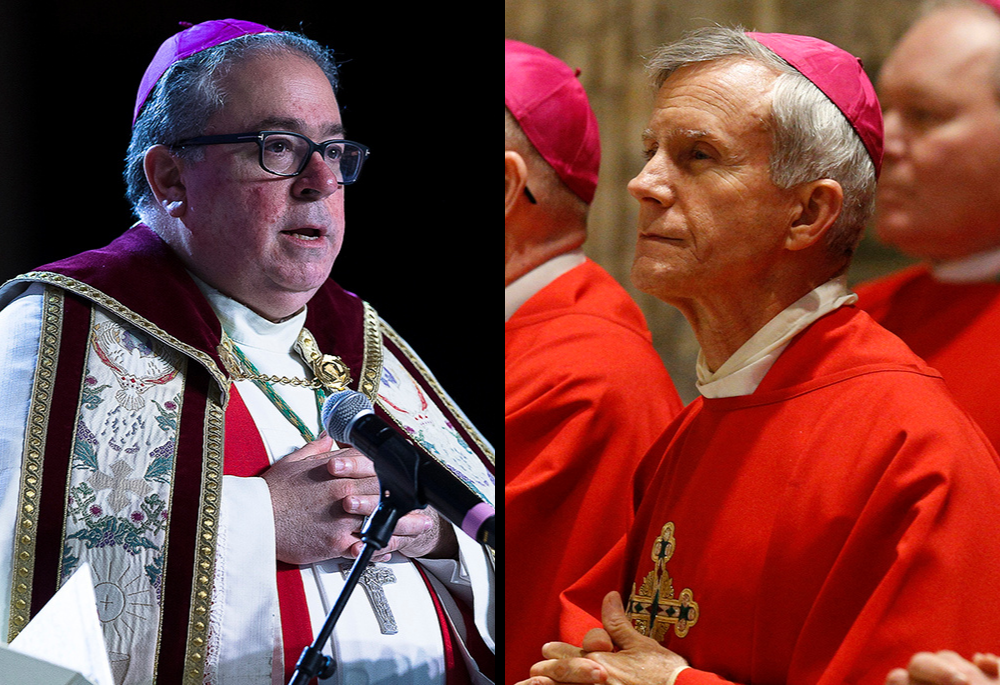
From left: Bishop Michael Olson of Fort Worth, Texas, in a 2018 photo; Bishop Joseph Strickland of Tyler, Texas, in a 2020 photo (CNS photos/Tyler Orsburn/Paul Haring)
"Houston, we have a problem." Tom Hanks' memorable line in the movie "Apollo 13," about the ill-fated space mission that almost ended in disaster, seems like an appropriate starting point to consider the ecclesiastical situation in the great state of Texas.
Last week, my colleague Brian Fraga reported on Fort Worth Bishop Michael Olson's decision to sack the head of Catholic Charities in his diocese. [Full disclosure: I was in seminary with Olson many years ago.] Fraga reported:
Olson turned down NCR's request for an interview through a diocesan spokesman, who provided a copy of a letter that the bishop sent to Plumlee. Dated April 4, Olson's letter accused Plumlee of "obstinate defiance" and refusing to recognize the bishop's responsibility to "teach the faith and to maintain the Catholic integrity" of the agency's mission.
Elsewhere in the letter, Olson writes: "I also inquired if you understood that what you were communicating meant that it was your position that the presence of the Bishop of Fort Worth at this event would injure the mission of Catholic Charities Fort Worth. While affirming your respect for me as a person, you affirmed that that was your position."
Whenever someone refers to themselves in the third person, my alarm bells go off. The letter put me in mind of a news story about Olson in the Fort Worth Star-Telegram, in which he told the newspaper, "I am not a dictator." If you have to say it, maybe people who think you are a dictator have a point. It was like former President Richard Nixon saying, "I'm not a crook."
The defensiveness, even petulance, with which Olson approaches these conflicts raises serious questions about his leadership abilities. I understand that being a bishop is a largely thankless job these days. And everyone is allowed a bad hair day. But the interview was in 2018, and it seems the same kind of issues still plague the diocese.
Further east, Bishop Joseph Strickland continues to endorse social media postings that criticize the Holy Father in the most vulgar terms. This past weekend, he shared a link to a video entitled "Pope Francis, Nancy Pelosi and the Tyrannical Culture of Death" in which Michael Matt of the Remnant not only compares the pope to Judas Iscariot, but says, "I have no temptation to leave my church for the same reason that Francis is always attacking it, because it's the true church and a diabolically disoriented clown like Francis knows that it is, it's his job to destroy this church because he has to get rid of true religion."
Strickland, the bishop of Tyler, Texas, didn't just link to the scurrilous video, he endorsed it, writing: "A sad commentary on the Church and state in our time. We need to wake up and stand for Truth. Jesus Christ is the Face of Truth. Again to this I say Viva Cristo Rey." I agree the commentary is sad, but not for the reason the bishop does.
Strickland has criticized Pope Francis before, for example, saying the pope was "dangerous" when he said he was open to "civil unions" for gay couples. Strickland broke protocol, and common sense, criticizing Chicago Cardinal Blase Cupich and Burlington Bishop Christopher Coyne when the two prelates disciplined priests within their jurisdictions. He has a habit for endorsing bigoted videos that contain anti-gay slurs and tell "faithful Catholics" that they can't vote for a Democrat.
Advertisement
Strickland's attacks on the pope, however, reach beyond the borders of his diocese. The Spanish website Religión Digital carried a news item about his latest endorsement of the video attacking the pope. His continued tenure as a diocesan bishop is a scandal.
The situation in Fort Worth is very different from that in Tyler, but the remedy to both situations is the same: It is time for an apostolic visitation in both dioceses. In Fort Worth, there are many things we do not yet know, some of which involve personnel matters that are always shrouded in mystery to those of us on the outside. In Tyler, the bishop demonstrates his incapacities in full view of the public on social media, and does so routinely.
Fort Worth is in the province of San Antonio and Tyler is in the province of Galveston-Houston. A request for an apostolic visitation starts with the metropolitan archbishops of those sees, Archbishop Gustavo García-Siller and Cardinal Daniel DiNardo, respectively. Houston, and San Antonio, we have a problem and it is time to take steps to address it.






